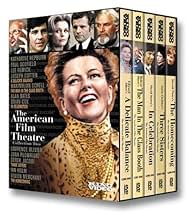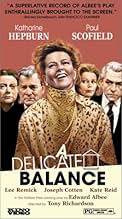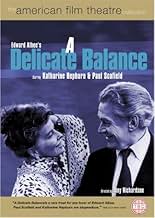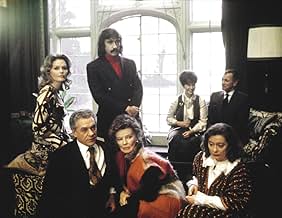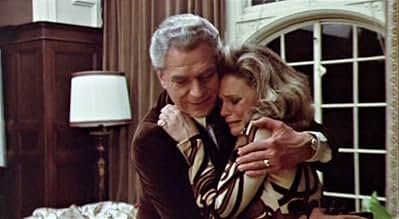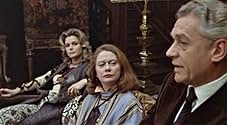IMDb-BEWERTUNG
6,5/10
1032
IHRE BEWERTUNG
Eine wohlhabende Familie aus Connecticut wird auf den Kopf gestellt.Eine wohlhabende Familie aus Connecticut wird auf den Kopf gestellt.Eine wohlhabende Familie aus Connecticut wird auf den Kopf gestellt.
- Auszeichnungen
- 1 Nominierung insgesamt
Empfohlene Bewertungen
Scenes from the life of an argumentative middle-class family: a strong-willed wife and a resigning husband are confronted with her alcoholic sister, their continuously marrying daughter, and their friend couple who are afraid of being alone.
Completely uncinematic, downbeat and very static photographed play, from a Pulitzer prize-winning Albee material, with all the psychological soul-killings expected from the author. A pretty valuable record of a theatrical performance: brilliant dialogue and acting are the best it can offer - and it does so.
Completely uncinematic, downbeat and very static photographed play, from a Pulitzer prize-winning Albee material, with all the psychological soul-killings expected from the author. A pretty valuable record of a theatrical performance: brilliant dialogue and acting are the best it can offer - and it does so.
After seeing this I tried to figure out why it is considered at all above the ordinary. The characters are: a domineering wife, a docile husband, an alcoholic sister, a daughter working on her fourth divorce, friends in a crisis of anxiety. I suppose this exaggerated mix is interesting to a playwright, but maybe not to an audience, at least to this member of the audience. My interest flagged while spending over two hours watching these unhappy people work through their long-standing problems.
Katharine Hepburn as Agnes, the wife, is, well, Katharine Hepburn. That is good as far as it goes, but her performance here seemed overly rehearsed--every body movement and spoken line struck me as anything but spontaneous. If I had not known that it was Paul Schofield as Tobias, the husband, I would not have found his performance all that remarkable. Kate Reid's performance as Claire, Agnes' alcoholic sister, might play well on stage, but here it struck me as embarrassingly overacted, perhaps exaggerated by the extreme close-ups and silly script elements like the accordion playing. Lee Remick did add some spark as Julia, the much-divorced daughter. Betsy Blair, as Edna, a supposed friend, gave little indication why Agnes and Tobias should find her of value (not sure if this was a result of her performance or the script). Joseph Cotton, as Harry, Edna's husband, turned in the most sincere performance, making me think that he has been under-appreciated as an actor.
I liked the question raised of when love for friends equals, or even trumps, inherent family bonds. This play gives credence to Robert Frost's quote, "Home is the place, when you have to go there, they have to take you in," and submits that this quote is not as nearly a given when applied to friends.
I found some character behaviors unfathomable. Consider Julia's reaction to Harry and Edna's taking over her bedroom. She was insulted by this from the beginning, but about midway through the play she went ballistic and finally flew upstairs in a rage. Later Harry reported that Julia had become hysterical and was blocking a doorway with her arms outstretched. I fully expected that in subsequent scenes Julia would be carted off to the nut house, but no, the next morning she was calm and collected. When Harry and Edna came in to the house uninvited, with the intention of moving in, they appeared to be disconnected from reality. But then overnight they became rational.
Spending time with these people would be something that I would not look forward too, but neither did I want to spend two hours with them in this movie, being confined to a house with nothing to entertain but conversation. On the other hand, I would not want to spend time with George and Martha of, "Who's Afraid of Virginia Woolf" either, but I found that movie spellbinding.
Rather than the filming of a stage play, this movie is an adaptation. No matter how director Richardson tries to break up the monotony by mixing close-ups and two shots and using different vantage points for the camera, he cannot overcome the essential staginess, particularly given Albee's stricture that his text was not to be changed. I think that the filming of a stage production of this might have been preferable, since there is no pretense there of a realistic setting. It was a delicate balance for the family in this play to stay together but the movie fails to achieve the delicate balance of turning a stage play into an engrossing movie.
I think only those who appreciate stage productions will truly appreciate this movie.
Katharine Hepburn as Agnes, the wife, is, well, Katharine Hepburn. That is good as far as it goes, but her performance here seemed overly rehearsed--every body movement and spoken line struck me as anything but spontaneous. If I had not known that it was Paul Schofield as Tobias, the husband, I would not have found his performance all that remarkable. Kate Reid's performance as Claire, Agnes' alcoholic sister, might play well on stage, but here it struck me as embarrassingly overacted, perhaps exaggerated by the extreme close-ups and silly script elements like the accordion playing. Lee Remick did add some spark as Julia, the much-divorced daughter. Betsy Blair, as Edna, a supposed friend, gave little indication why Agnes and Tobias should find her of value (not sure if this was a result of her performance or the script). Joseph Cotton, as Harry, Edna's husband, turned in the most sincere performance, making me think that he has been under-appreciated as an actor.
I liked the question raised of when love for friends equals, or even trumps, inherent family bonds. This play gives credence to Robert Frost's quote, "Home is the place, when you have to go there, they have to take you in," and submits that this quote is not as nearly a given when applied to friends.
I found some character behaviors unfathomable. Consider Julia's reaction to Harry and Edna's taking over her bedroom. She was insulted by this from the beginning, but about midway through the play she went ballistic and finally flew upstairs in a rage. Later Harry reported that Julia had become hysterical and was blocking a doorway with her arms outstretched. I fully expected that in subsequent scenes Julia would be carted off to the nut house, but no, the next morning she was calm and collected. When Harry and Edna came in to the house uninvited, with the intention of moving in, they appeared to be disconnected from reality. But then overnight they became rational.
Spending time with these people would be something that I would not look forward too, but neither did I want to spend two hours with them in this movie, being confined to a house with nothing to entertain but conversation. On the other hand, I would not want to spend time with George and Martha of, "Who's Afraid of Virginia Woolf" either, but I found that movie spellbinding.
Rather than the filming of a stage play, this movie is an adaptation. No matter how director Richardson tries to break up the monotony by mixing close-ups and two shots and using different vantage points for the camera, he cannot overcome the essential staginess, particularly given Albee's stricture that his text was not to be changed. I think that the filming of a stage production of this might have been preferable, since there is no pretense there of a realistic setting. It was a delicate balance for the family in this play to stay together but the movie fails to achieve the delicate balance of turning a stage play into an engrossing movie.
I think only those who appreciate stage productions will truly appreciate this movie.
Time has not been kind to the movies made under the umbrella of the well intentioned American Film Theater. The bulk of these works are way off the mark, failing to achieve one of the major goals of the project; the preservation of these important plays on screen. "Butley", "The Homecoming" and "A Delicate Balance" are the ones that came off best.
"A Delicate Balance" Albee in his prime; relentlessly razor sharp. Director Tony Richardson thankfully makes little effort to diminish the inherent staginess and theatricality. He allows his superb cast to milk Albee's barbs to their last drop.
Katherine Hepburn turns in a terrific performance, though those who have a distaste for the Hepburn mannerisms, will not be converted. It's a pleasure to watch both Kate Reid and Paul Scofield, consummate stage performers who fared far less well in the cinema.
While overlong and at times uneven, "A Delicate Balance" is strictly for theater lovers. They will not be disappointed.
"A Delicate Balance" Albee in his prime; relentlessly razor sharp. Director Tony Richardson thankfully makes little effort to diminish the inherent staginess and theatricality. He allows his superb cast to milk Albee's barbs to their last drop.
Katherine Hepburn turns in a terrific performance, though those who have a distaste for the Hepburn mannerisms, will not be converted. It's a pleasure to watch both Kate Reid and Paul Scofield, consummate stage performers who fared far less well in the cinema.
While overlong and at times uneven, "A Delicate Balance" is strictly for theater lovers. They will not be disappointed.
.. a play about fear and loss among the upper middle class. I finally caught up with this filmed version starring Katharine Hepburn and Paul Scofield as the discontented Agnes and Tobias who wander around their expansive Connecticut house and wonder why they're not happy. Their private little world has been breached by Agnes' sister Claire (Kate Reid) who drinks too much and talks even more. But the sparring sisters are also fun compared to the others about to enter the house. Dear friends Harry and Edna (Joseph Cotton and Betsy Bair) suddenly appear and move into a bedroom, seeming with no intentions of leaving because they have given in to free-floating anxieties.
After them comes bitter daughter Julia (Lee Remick) who has separated from her 4th husband. The once spacious house is now filled with unhappy adults who all want something but seem to have no idea as to what that might be. Marvelous performances by all, although the Blair character seems truly unlikable, especially when she presumes the role of motherhood over Remick. Kate Reid pretty much steals the show as the hard-drinking Claire.
After them comes bitter daughter Julia (Lee Remick) who has separated from her 4th husband. The once spacious house is now filled with unhappy adults who all want something but seem to have no idea as to what that might be. Marvelous performances by all, although the Blair character seems truly unlikable, especially when she presumes the role of motherhood over Remick. Kate Reid pretty much steals the show as the hard-drinking Claire.
Probably were it not for the American Film Theater, that noble project which ultimately did fail of bringing productions of classical American works to film, we might never have seen A Delicate Balance. It's like a lot of O'Neill's work, it's all in the creation of the characters.
Certainly a play which consists of six characters sitting around and talking would not be considered anything film-able today. A Delicate Balance for me seems to take off in the same directions as Edward Albee's other classic, Who's Afraid of Virginia Woolf and also bears no small resemblance to O'Neill's Long Day's Journey Into Night.
Both of those films however had bigger budgets and were made more cinematic by having the players move into various locations. The one set technique just doesn't work here. This is not for instance a story as gripping as Alfred Hitchcock's Rope or Rear Window. My guess is that the budget was blown on getting the high priced stars.
Paul Scofield and Katharine Hepburn play a pair of sixty somethings married and living in a posh Connecticut suburb, the kind of place Hepburn grew up in and knew well. Living with them is Hepburn's leach of a sister Kate Reid who they keep well supplied with alcohol and who lives there at Hepburn's insistence. Otherwise Scofield would have tossed this one out with the trash years ago. But he bows to Hepburn's wishes to keep peace and order, a delicate balance if you will.
They get two intruders in their well ordered lives one day. Their neighbors and long time friends, Joseph Cotten and Betsy Blair just ring the bell and announce that something unknown has frightened them in their home and they need to move out and move in with them. Scofield offers them his daughter's room.
But then daughter announces she's moving back after failed marriage number four. Needless to say that causes the balance to go out of whack. Lee Remick is the daughter and she's a selfish and spoiled suburban princess. After this everybody grates on each other's nerves.
Short and on plot, but deep on characterization is A Delicate Balance. It explores the problems of old age and loneliness. Cotten and Blair have no children and Scofield and Hepburn take little comfort in Remick. Perhaps if there were grandchildren things might be different for both couples. There was a son who died for Hepburn and Scofield and that seems to have cast a permanent pall over both of them.
Though Remick is blood kin, Hepburn and especially Scofield have more in common with their neighbors. How it all works out is for you to see A Delicate Balance for.
The film's saving grace is the wonderful performances by the cast. The original Broadway production ran for 132 performances in 1966-1967 and starred Hume Cronyn and Jessica Tandy in the Scofield-Hepburn roles. But certainly Kate and Paul were going to sell more tickets than either of the other two worthy players.
Not that A Delicate Balance did much business back in the day. These films were for limited release in any event and if it's making money it's now in video sales and rentals. Still we can thank the American Film Theater for its preservation with some of the best preservers around.
Certainly a play which consists of six characters sitting around and talking would not be considered anything film-able today. A Delicate Balance for me seems to take off in the same directions as Edward Albee's other classic, Who's Afraid of Virginia Woolf and also bears no small resemblance to O'Neill's Long Day's Journey Into Night.
Both of those films however had bigger budgets and were made more cinematic by having the players move into various locations. The one set technique just doesn't work here. This is not for instance a story as gripping as Alfred Hitchcock's Rope or Rear Window. My guess is that the budget was blown on getting the high priced stars.
Paul Scofield and Katharine Hepburn play a pair of sixty somethings married and living in a posh Connecticut suburb, the kind of place Hepburn grew up in and knew well. Living with them is Hepburn's leach of a sister Kate Reid who they keep well supplied with alcohol and who lives there at Hepburn's insistence. Otherwise Scofield would have tossed this one out with the trash years ago. But he bows to Hepburn's wishes to keep peace and order, a delicate balance if you will.
They get two intruders in their well ordered lives one day. Their neighbors and long time friends, Joseph Cotten and Betsy Blair just ring the bell and announce that something unknown has frightened them in their home and they need to move out and move in with them. Scofield offers them his daughter's room.
But then daughter announces she's moving back after failed marriage number four. Needless to say that causes the balance to go out of whack. Lee Remick is the daughter and she's a selfish and spoiled suburban princess. After this everybody grates on each other's nerves.
Short and on plot, but deep on characterization is A Delicate Balance. It explores the problems of old age and loneliness. Cotten and Blair have no children and Scofield and Hepburn take little comfort in Remick. Perhaps if there were grandchildren things might be different for both couples. There was a son who died for Hepburn and Scofield and that seems to have cast a permanent pall over both of them.
Though Remick is blood kin, Hepburn and especially Scofield have more in common with their neighbors. How it all works out is for you to see A Delicate Balance for.
The film's saving grace is the wonderful performances by the cast. The original Broadway production ran for 132 performances in 1966-1967 and starred Hume Cronyn and Jessica Tandy in the Scofield-Hepburn roles. But certainly Kate and Paul were going to sell more tickets than either of the other two worthy players.
Not that A Delicate Balance did much business back in the day. These films were for limited release in any event and if it's making money it's now in video sales and rentals. Still we can thank the American Film Theater for its preservation with some of the best preservers around.
Wusstest du schon
- WissenswertesThis was the first (and only) time that Joseph Cotten and Katharine Hepburn appeared together since they starred in the original Broadway production of "The Philadelphia Story" in 1939.
- Zitate
Agnes: Time! Time happens, I suppose, to people. Everything becomes... too late, finally. You know it's going on up on the hill; you can see the dust, and hear the cries, and the steel... but you wait, and time happens. When you do go, sword, shield... finally... there's nothing there... save rust, bones and the wind.
Top-Auswahl
Melde dich zum Bewerten an und greife auf die Watchlist für personalisierte Empfehlungen zu.
- How long is A Delicate Balance?Powered by Alexa
Details
- Erscheinungsdatum
- Herkunftsländer
- Sprache
- Auch bekannt als
- Un equilibrio delicado
- Drehorte
- Produktionsfirmen
- Weitere beteiligte Unternehmen bei IMDbPro anzeigen
- Laufzeit2 Stunden 13 Minuten
- Sound-Mix
- Seitenverhältnis
- 1.78 : 1
Zu dieser Seite beitragen
Bearbeitung vorschlagen oder fehlenden Inhalt hinzufügen

Oberste Lücke
By what name was Empfindliches Gleichgewicht (1973) officially released in India in English?
Antwort

